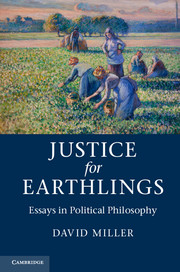Book contents
- Frontmatter
- Contents
- Acknowledgements
- Introduction
- 1 Political philosophy for Earthlings
- 2 Two ways to think about justice
- 3 Social justice in multicultural societies
- 4 Liberalism, equal opportunities and cultural commitments
- 5 Equality of opportunity and the family
- 6 Justice and boundaries
- 7 Social justice versus global justice?
- 8 ‘Are they my poor?’: the problem of altruism in a world of strangers
- 9 Taking up the slack? Responsibility and justice in situations of partial compliance
- 10 A tale of two cities; or, political philosophy as lamentation
- Index
- References
7 - Social justice versus global justice?
Published online by Cambridge University Press: 05 February 2013
- Frontmatter
- Contents
- Acknowledgements
- Introduction
- 1 Political philosophy for Earthlings
- 2 Two ways to think about justice
- 3 Social justice in multicultural societies
- 4 Liberalism, equal opportunities and cultural commitments
- 5 Equality of opportunity and the family
- 6 Justice and boundaries
- 7 Social justice versus global justice?
- 8 ‘Are they my poor?’: the problem of altruism in a world of strangers
- 9 Taking up the slack? Responsibility and justice in situations of partial compliance
- 10 A tale of two cities; or, political philosophy as lamentation
- Index
- References
Summary
Few things have played a more fatal part in the history of human thought and action than great imaginative analogies from one sphere, in which a particular principle is applicable and valid, to other provinces, where its effects may be exciting and transforming, but where its consequences may be fallacious in theory and ruinous in practice.
The idea of global justice is comparatively new: it was rarely used before the last decades of the twentieth century. The idea of social justice, by contrast, has been with us for a century or more. When a new political idea appears in the wake of a longer-established one, it is natural, perhaps almost unavoidable, to see the second as simply a development of the first. Social justice was a central idea in twentieth century politics, in democratic societies especially. It was the banner under which the battle for equal rights, equality of opportunity, the welfare state and other such goals was fought within each separate state. Alongside the political battle, philosophers elaborated numerous theories of social justice, the most celebrated perhaps of which was that of John Rawls, as set out in his book A Theory of Justice and later works. So, when later on these philosophers and others began to think about what justice might mean on a global scale, it was natural that they should start by taking familiar principles of social justice and exploring how these could be applied beyond the realm of domestic politics. The implicit assumption here was that at a fundamental level social justice and global justice are one and the same, the difference between them being essentially a practical difference of scope: social justice is justice within bounded societies, while global justice is justice across humanity as a whole. In line with this, the use of the phrase ‘global social justice’ in popular political discourse makes this assumption evident.
- Type
- Chapter
- Information
- Justice for EarthlingsEssays in Political Philosophy, pp. 165 - 182Publisher: Cambridge University PressPrint publication year: 2013



